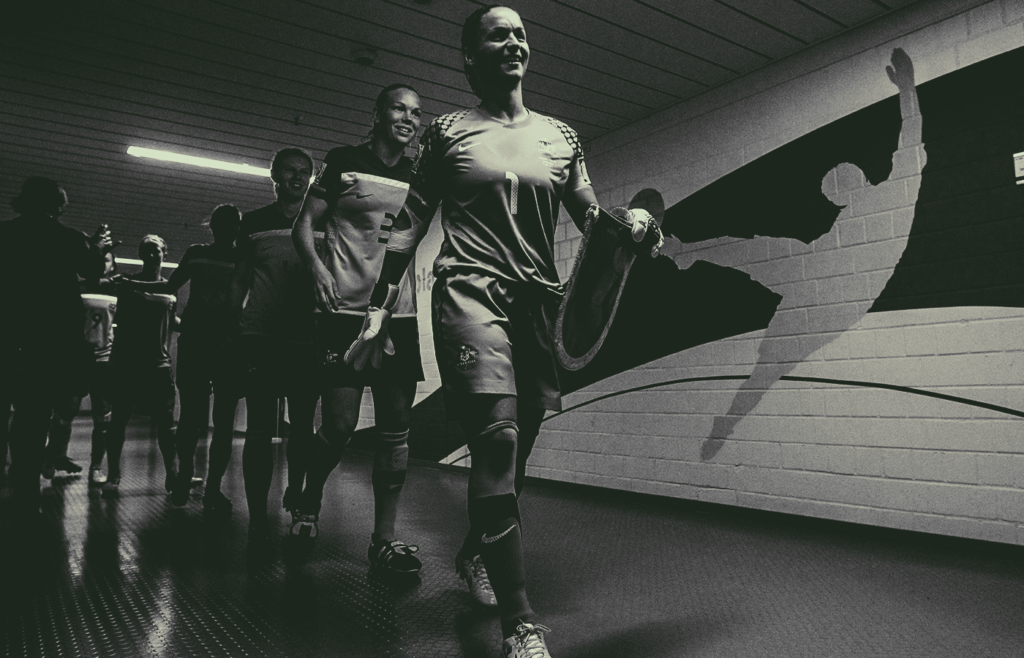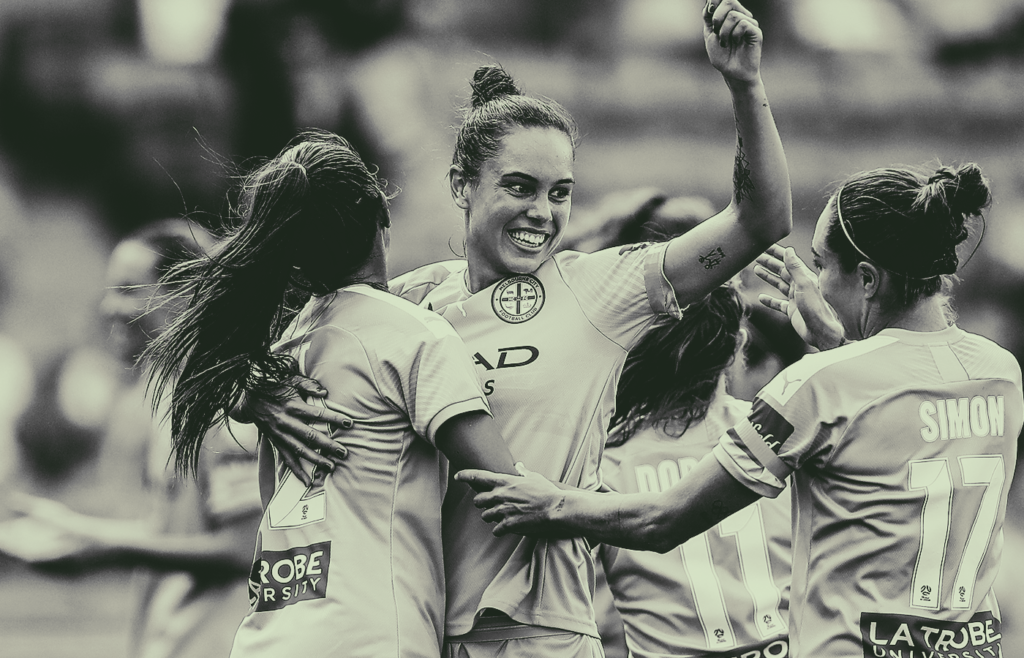Words by Joey Lynch
As Australian football prepares to celebrate International Women’s Day, it owes a lot to players like Melissa Barbieri.
Both a pioneer and a first-hand witness to the growth – both in terms of respect and professionalism – that has occurred in the women’s game across the past 20 years, the living legend is still making her mark on the game today as gains are consolidated and new paths of progress forged.
Making her international debut against Canada in 2002, Barbieri has been to four World Cups, three Asian Cups and the 2004 Olympic Games in Athens; wearing the armband and in goal in 2010 when Australia triumphed over North Korea in a penalty shootout in the Women’s Asian Cup final – Australia’s first-ever continental triumph in Asia.
Though she had initially been expected to bow out of club football soon after her international retirement in 2015, she was soon lured back to the W-League with Melbourne City and has since served as both a back-up goalkeeper and assistant coach at the club.

“[Major] milestones in terms of gaining better [outcomes] for ourselves was probably the first time was getting a paycheck for the Matildas, a daily wage,” the 88-time Matilda recalled to The PFA.
“That was a huge step, so going on camps wasn’t costing you money, that was the main thing.
“Then the next one would be coming into contract situations, we had a contract situation before we had PFA which we managed to barter ourselves.
“And then the PFA involvement, getting involved after that because we wanted more provisions – like internet and boots.
“The next one was 2015 when we boycotted the US tour mainly because we hadn’t been paid for two months. And that coincided with me retiring because I couldn’t afford to train for nothing.
“And then more recently, the growth in the W-League; the minimum pay wage being brought up to a substantial amount that not only the young but the older generation can continue to play.”
These hard-fought gains in these areas have been largely driven by collective action, with Australia’s women – both with and without support – continuing to fight for respect and recognition as they looked to play the game they loved.
“All over in terms of pay and everything that’s been driven by us and our standards,” Barbieri said.
“Because everything that we have asked for, that’s why the PFA’s asked for it.
“There’s never been a time when they’ve been like ‘you should be doing this’ or ‘you should be doing that,’ it’s always been ‘hey, we feel like this’ and then they bring it to the table in a way that they think would be a good outcome for both parties.”

Particularly important for players like Barbieri has, despite there still remaining a way to go, been increases in the provision of maternity support to footballers looking to balance their careers and motherhood.
The recently signed collective bargaining agreement between the PFA and FFA secured a commitment from Australian football’s governing body to investigate greater levels of support to Matildas during pregnancy and in their subsequent return to the national setup.
Collective bargaining agreements signed with the W-League in 2017 also ensure that players that fall pregnant during the season will still receive their contracts and match fees and that extra travel and accommodation support is provided to children under the age of three.
In the past, Barbieri lost her contracts with both the national team and Football Federation Victoria – who then were in control of Melbourne Victory – when she gave birth to daughter Holly in 2013 and was thus forced into debt as she looked to return to the game.
“I mean, in both respects, there’s a huge avenue for growth with players,” said Barbieri.
“So players going out there and getting pregnant and not put their life goals on hold for their soccer goals. That’s one step, we need to be brave in going that.”
Of course, the continued growth and recognition of Australia’s female footballers also comes with hitherto unknown opportunities, but also challenges.
The likes of Sam Kerr (Chelsea), Caitlin Foord (Arsenal), Alex Chidiac (Atlético Madrid), Hayley Raso (Everton), Lisa De Vanna (Fiorentina), and Emily Gielnik (FC Bayern München) have all recently made moves to Europe as Australia’s women are recognised by some of the world’s biggest clubs as genuine world-class stars.
However, the absence of these global stars from the W-League – with the European seasons conflicting with Australia’s domestic league – creates a void that needs to be filled – both from a playing perspective but also a branding one.
As their idols depart, young players that have come up through ranks of the Junior and Young Matildas and state-based NPL competitions will need to attempt to replace the on-field product.
And as their most marketable names head overseas and link up with some of the biggest brands in world football, W-League clubs will need to create new stars to fill that void.
“With Sam Kerr and all the key Matildas leaving and going over to England [and Europe] and playing, it’s obviously a big loss for the W-League,” 21-year-old Western Sydney Wanderers’ attacker Cortnee Vine said.
“But I think it gives the younger girls an opportunity to step up and the girls from the NPLW to get their turn. I see it happening.”
Another obvious area of improvement that remains on the agenda as the women’s game continues to grow is facilities.
Melbourne City, who will enter the 2019/20 finals series unbeaten, have won three of the past four W-League championships and built a large part of that success on their willingness to invest in facilities that afford their women’s players an opportunity to enjoy access to an elite training environment.
“For sure, it’s a big draw-card when you’re trying to sell a position to a player,” Emma Checker, who signed for City ahead of the 2019/20 season, said.

“I know for me the minute I walked in, I didn’t want to leave without playing here.
“Once you’re exposed to facilities like this and you know that you’re going to have the best brought out of you when you have resources available. I think it is really important and I think, for a number of reasons, it’s important for women’s football and the standard of football.
“Because resources and being exposed to this brings the best out of people and it’s something really important that I think clubs need to look at more.”
In 2019/20, Western Sydney Wanderers’ W-League side made finals for the first time in their existence after moving – alongside their A-League side – into elite training facilities in Blacktown.
“Coming from Newcastle, the Jets don’t really have a place to call their home and coming to somewhere where you can call your training ground home is unbelievable,” said Vine, who will be playing with Sydney Olympic during the coming W-League offseason.
“Just having a place to call home, like a lot of the men’s teams already have, a lot of the girl’s teams don’t have it and just getting that and making it more professional helps a lot.”
For Barbieri, a closing of the gap between club footballer and international representative also represents a coming frontier.
“Right now, we’re at this stage where our Matildas are mostly very young and they’re going to be in the team for a while,” she explained.
“So, there’s this inkling in the community that players need to make the Matildas in order to be a professional footballer – when that’s not the case.
“You can ply your trade overseas, you can bide your time very much as the Socceroos do.
“How many players play overseas and then make the Socceroos down the track? Most of them.
“We have to bridge that identity gap that playing professionally should be everybody’s goal and the Matildas is the cherry on the top, like it is for the boys. That’s where the growth should be.”







